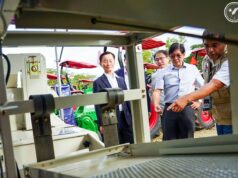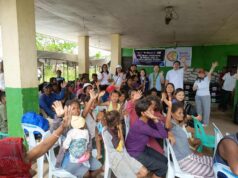“There is now growing uneasiness and impatience among the NDFP delegation over the snail’s pace in the steps being taken to effect the release of the remaining political prisoners despite repeated promises and assurances coming from the GRP (Government of the Republic of the Philippines) panel,” the NDFP said in a statement.
The NDFP noted that “there are more than 400 political prisoners still languishing in various jails nationwide.”
“The issue of their continued detention came up early in the talks as the new NDFP Panel chairperson Fidel Agcaoili cited the pledge made by Pres. Rodrigo Duterte himself last May to issue an amnesty proclamation to speed up their release. So far, the GRP has released only 22 political prisoners, most of them NDFP consultants. There have been no other releases since August,” it said.
“In response to the appeal from GRP Panel chairperson Silvestre Bello for patience, Agcaoili said that if the GRP could effect the speedy release of the 22 JASIG-protected NDFP consultants why the seemingly excruciating difficulty in releasing the rest of the political prisoners?” the NDFP asked.
JASIG stands for Joint Agreement on Safety and Immunity Guarantees signed between the NDFP and the government in the Netherlands in 1995 adopting safety and immunity guarantees to protect the rights of NDFP negotiators, consultants, staffers, security and other personnel who participate in the peace negotiations.
The statement said that “under pressure from the consistent pressing of the NDFP on this issue, the GRP Panel once again promised ‘to do their best’.”
“But cynicism is now growing among some of the NDFP negotiators and consultants as well as among the remaining political prisoners on account of so many unfulfi lled promises,” the NDFP lamented.
AFP operations
The NDFP also said that “aside from the issue of political prisoners, reports have been coming in from the field about continuous military operations by AFP forces in NPA (New People’s Army) territory.”
“According to NPA commands from various regions, the reason why there has been no firefights so far is mainly because NPA forces have been maneuvering to avoid armed encounters. But tensions are rising because the AFP military operations appear more and more to be taking the form of base-denial operations targeting the mass base of the NPA,” it noted.
The NDFP quoted NPA national spokesperson Jorge Madlos as saying that “all NPA units have strictly abided by its own unilateral ceasefire declaration. Aside from maintaining defensive posture, NPA units are conducting counter-maneuvers to avoid armed skirmishes with the AFP.”
“But not a few NPA units are having difficulty holding back amid threats from the AFP in its counter-insurgency intelligence operations,” Madlos said.
He also reported that “from Northern Luzon to Southern Mindanao, there were reports of AFP units telling civilians that the ceasefire is no longer in effect to justify their operations and presence in their communities.”
“The NPA’s Agustin Begnalen Command based in Abra said the Army’s 24th Infantry Battalion have been telling civilians in Sallapadan town that the ceasefire has ended,” he added.
Madlos also said “the AFP has yet to observe the advice of President Duterte to be friendly to the NPA adding that the AFP continues to conduct hostile operations against the NPA, even using the drug campaign as pretext to conduct anti-NPA operations.”
“To have a stable ceasefi re AFP forces must return to barracks at the level of the battalion headquarters,” the NDFP said.
The NDFP also cited “political assassinations and attempted assassinations of leaders of people’s organizations” as it cited the case of the secretary general of the Compostela Valley Farmers Association (CFA), Jimmy Saipan, who was killed in cold blood by two motorcycle- riding gunmen last Oct. 10.
“Saipan was a Lumad anti-mining activist opposing the exploration by the Agusan Petroleum Mineral Corp. in 12,000 hectares of Lumad lands. The CFA has also been conducting dialogue with the 66th IB for the latter to stop occupying their community. The AFP has falsely accused the CFA as a communist front organization,” the NDFP noted.
The NDFP, however, noted “some progress” in the last Oslo peace talks.
Impatience
The NDFP said its chief political consultant Jose Maria Sison and its peace panel chair Agcaoili have “shown impatience” by “serving notice to the other side that continued non-compliance on the issue of the remaining political prisoners can have serious consequences in the continuation of the current ceasefire and forward movement in the peace negotiations as a whole.”
“On the other hand, compliance will boost the prospects for forging a bilateral ceasefi re agreement and acceleration of the peace process,” it added.
“The Reciprocal Working Committee on Social and Economic Reforms (RWC-SER) took the longest to come up with a common framework and outline. NDFP negotiators sensed an apparent attempt on the side of the GRP to confine the discussion to existing programs of government agencies as the ‘solutions’ without first arriving at a well thought-out understanding of the problems. This prompted NDFP RWCSER head Juliet de Lima to remark that this was putting the cart before the horse,” the NDFP also said.
The NDFP also noted a “great chasm between the two sides exists in the appreciation of what the NDFP considers the age-old problems of rural landlessness and poverty due to the persistence of feudalism, and the absence of real industrialization that has failed to create jobs resulting in massive unemployment which forces 2,000 Filipino workers to go abroad every day to seek for work.”
“Previous government programs have consistently failed to address the problems of rural poverty and urban mass unemployment precisely because these have been based on a superficial and faulty analysis of the deeply- seated problems,” it added.
The panels agreed to meet again in the third week of January 2017 in a foreign neutral venue with many uncertainties remaining to haunt the peace process.




